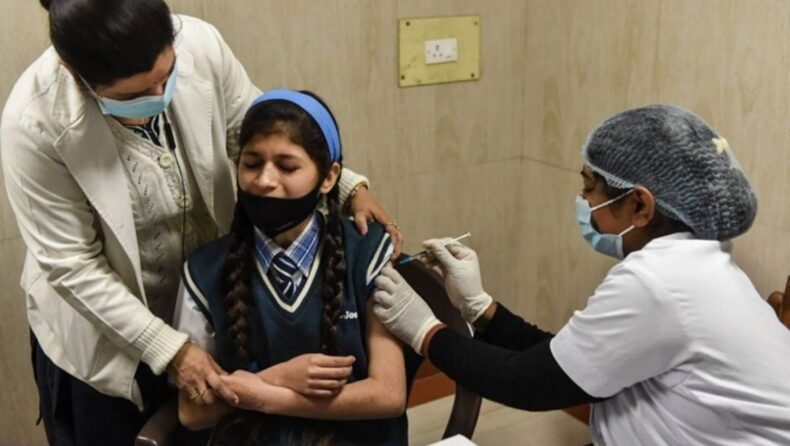In the midst of an alarming third wave, it becomes all the more important to get children vaccinated.
The National Technical Advisory Group on Immunisation’s chairman Dr. NK Arora declared that the COVID-19 vaccination drive for 12-14 would start from March this year.
NTAGI provides critical expertise regarding introducing new vaccines and strengthening the Universal Immunisation Programme (UIP) in India.
Dr. NK Arora said the vaccination drive for teenagers aged 15-18 has shown impeccable results. Almost 3.30 crore young adults have completed their first dose of covaxin in just 13 days of the drive. The vaccine drive for teenagers will be over by the end of February. After that, the vaccination for the 12-14-year-olds can start.
NTAGI chief Dr. NK Arora said to cover all the 7.4 crore adolescents in the 15-17 age bracket with the first dose by January-end. The vaccination for the same group can get vaccinated with the second dose from early February and get finished by the end of February.
“We want to start vaccinating children between 12 and 14 years from February-end or early March,” said Dr. NK Arora.
The decision taken by NTAGI was mainly to protect the adolescents in the 15-17 age group. After their complete vaccination, the government will include the next age group, the 12-14 bracket.

For children between the ages group 15-18, it’s decided that Bharat Biotech’s Covaxin will be applied. With trials, Covaxin is also suitable for the 2-18 age group.

Views By Doctors
Dr. Pramod Jog, former national president of the Indian Academy of Paediatrics, said covering children’s large vaccination drives is a welcome step. He further stated that the government should also consider prioritizing the vaccination of comorbid children in the 5-14 age group as they are also more at risk of developing severe Covid.
Many doctors believe that vaccinating children above five years is essential, especially for children with low immunity; the virus can attack quickly.
Dr. Faheem Younus said that the current science clearly states that we should vaccinate children over five. If vaccinations are safe, then it becomes a question of supply and demand and infrastructure.
“How quickly you can roll out those vaccines and the level of vaccine hesitancy in your community? If you have an unlimited supply and there is no vaccine hesitancy, then yes, we should vaccinate children.”
He further said that Omicron tends to infect the upper respiratory tract more than our lungs and lower respiratory tract. Children whose upper respiratory tract is still developing become more prone to contracting the infection.
Young adults were asked to use the photo identity card issued by their schools for registration on the national vaccine portal CoWIN. For the age bracket of 12-14, the registration is unclear yet.

India and Covid vaccination
With expert views, vaccinating children is crucial in achieving more than herd immunity.
India announced its first vaccination in January 2021 between 45-60 years of age. The drive went slow initially but gained momentum and became the base for the success of 47 % fully vaccinated Indians.
The series of vaccination continued with more diverse age groups. Amidst lakhs of deaths across the nation, wastage of the number of vaccines, a wave of rumors, and several internal and external emergencies, the country succeeded in getting at least the first dose of vaccine.
In a densely populated country like India, delay in vaccination will only increase the chances of the covid-19 infection. Seeing the insurgence of Omicron, the decision to vaccinate every citizen as soon as possible becomes a primary concern so that the country does not have to go through the covid wave that took place from April 2021 to July 2021.
Published By: Khushboo Mehta
Edited By: Subbuthai Padma













